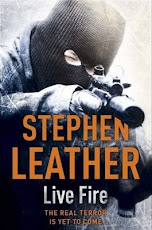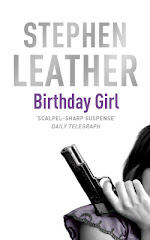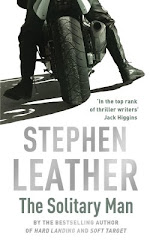I’m just over 60,000 words into the book I’m writing about the police negotiator, Jack Nightingale. I saw a clip from Pirates Of The Caribbean last night and suddenly realised that Johnny Depp plays Jack Sparrow! I’m not sure if that’s going to be a problem or not.
I’m not sure how long this book is going to be. My last few thrillers have all been about 135,000 words but I think this one will be much shorter, maybe just 75,000 words. Books can vary a lot, and really the number of words doesn’t bear that much relation to the number of pages of the published book. That sounds strange, but there can be a big variation on the number of words on the printed page. My last book, Dead Men, came in at 372 pages, and it looked good. But I’ve just received my copies of Live Fire, which will be in the shops next year, and it’s 472 pages, a full one hundred pages more. It looks a much more substantial book, but has the same number of words, pretty much, as Dead Men.
At the moment I’m reading A Most Wanted Man by John Le Carre, which is brilliant. It’s 340 pages long but I don’t think it’s much more than 110,000 words. And my first book, Pay Off, was only about 65,000 words and my second, The Fireman, was 80,000. Back then I didn’t have a laptop so typing was much harder!
I’m itching to get started on the new Dan Shepherd book. I’m going to have a group of vigilante cops killing some very nasty criminals who had escaped traditional justice, so that’s going to give me some very exciting scenes to write up front, which is always the best way to start a book.
The new book will be as long as Dead Men and Live Fire, I hope, and I have five months to deliver it. That’s not a problem – 150 days and 135,000 words means about 900 words a day, which isn’t heavy going! I plan to start writing it on January 1, providing I don’t have too much of a hangover!
Anyway, here’s the second chapter of the police negotiator book. For the first time I’m going to use chapters, usually I just write in scenes separated by spaces. I want to see what it’s like to write in chapters, and also chapters can make a short book seem longer!
CHAPTER TWO
What happened later that chilly November morning really depends on who you talk to. Jack Nightingale never spoke about it and refused to answer any questions put to him by the two investigators assigned to the case. They were from the Metropolitan Police’s Professional Standards Department, and while they had every sympathy with Nightingale’s position they took their jobs seriously and questioned him for more than twenty hours over four days. During that time he said not one word to them. If you’d asked the two detectives they’d have said that they were pretty sure that Nightingale had thrown Simon Underwood through the window. If they’d been speaking off the record they would probably have said that they had every sympathy with Nightingale and that given the chance they would probably have done the same. Like policemen the world over they knew that paedophiles never stopped offending. You could put them in prison so that they couldn’t get near children or you could kill them but you could never change their natures.
The post-mortem on the little girl had shown signs of sexual activity and there was bruising and bite marks on her legs and stomach. A forensic dentistry expert was able to match two of the clearer marks to the father’s dental records. And a swab of the little girl’s vagina showed up the father’s sperm. The evidence was conclusive, he had been raping her over a long period, over several years according to the coroner. The investigating officers presented the evidence to the mother, but she denied all knowledge of any abuse. The investigating officers didn’t believe her.
Underwood had been in a meeting with six employees from the bank’s marketing department when Nightingale walked out of the lift on the tenth floor of the bank building in Canary Wharf. He had shown his warrant card to a young receptionist and demanded to be told where Underwood was. The receptionist later told investigators that Nightingale had a strange look in his eyes. ‘Manic,’ she told them. ‘He was manic.’ The receptionist had pointed down the corridor to Underwood’s office and he had walked away. She had called security but by the time they had reached the tenth floor it was all over.
Nightingale had burst into Underwood’s office but he wasn’t in and his terrified secretary told him that her boss was down the corridor. She later told the investigators that Nightingale had been icy cold and there had been no emotion in his voice. ‘It was as if he was a robot, or on autopilot or something,’ she said.
There were differing descriptions from the six witnesses who were in the meeting room with Underwood. One said he looked crazed, two repeated the secretary’s assertion that he was icy cold, two woman said he seemed confused, and the senior marketing manager said that he reminded her of the Terminator in the second movie, the one that Arnold Schwarzenegger was trying to kill. The investigators knew that personal recollections were the most unreliable of evidence but the one thing that all the witnesses agreed on was that Nightingale had told everyone to leave, that he had closed the door behind them and that a few seconds later there was an almighty crash as Simon Underwood exited through the window.
Was he pushed? Did he trip? Did Nightingale hit him and he fell accidentally? Was Underwood so stricken by guilt that he threw himself through the window? The investigators put every possible scenario to Nightingale, and threw in a few impossible ones for good measure, but Nightingale refused to say anything. He didn’t even say ‘No Comment’. He just sat looking at the investigators with a look of bored indifference on his face. They asked him several times if he wanted the services of his Police Federation representative, but Nightingale shook his head. The only time he did speak was to ask to go to the toilet or to go outside to smoke a cigarette.
For the first couple of days the newspapers were after Nightingale’s blood, crying police brutality, but then a sympathetic clerk in the coroner’s office leaked the post-mortem details to a journalist on The Sunday Times and once it became known that Underwood had been molesting his daughter the tide turned and the tabloids starting calling for Nightingale to be honoured rather than persecuted.
The Independent Police Complaints Commission sent two more investigators to talk to Nightingale but he was as uncommunicative with them as he had been with the PSD detectives. The IPCC officers offered Nightingale a deal, if he told them that Underwood had jumped then there would be no charges. If he told them that Underwood had slipped and fallen through the window, there would be no charges. All they wanted was to be able to close the file on the man’s death. Nightingale said nothing. There were those in the Met who said that Nightingale had his head screwed on right, that the IPCC and the PSD were lying sons of bitches and that no matter what he said they would hang him out to dry. There were others in the job who said that Nightingale was an honourable man, that he’d killed Underwood and he wasn’t prepared to lie about what he’d done. Whatever the reason, whatever had happened to Underwood, Nightingale simply refused to talk about it, and after week the investigators gave up.
Nightingale went to Sophie’s funeral but kept his distance, not wanting to intrude on the family’s grief. A photographer from one of the Sunday tabloids tried to take his picture but Nightingale grabbed his camera and smashed it against a gravestone. Nightingale left before Sophie’s coffin was lowered into the cold, damp soil.
There were two reports into the death, one by the PSD and one from the IPCC. Both were inconclusive and both criticised Nightingale for refusing to cooperate. Without Nightingale’s statement, there was no way that anyone would know what had happened in the meeting room that day. There were two eyewitnesses who saw the body fall and slap into the Tarmac, close enough to hear Sophie’s father shout ‘No!’ all the way down, but not close enough to see if he had jumped or if he had been pushed. There was CCTV footage of the reception area which clearly showed Nightingale arriving and leaving, but there was no coverage of the room and no CCTV cameras covering the area where Underwood hit the ground. Both reports went to the Crown Prosecution Service’s offices at Ludgate and they decided there wasn’t enough evidence to prosecute Nightingale.
Nightingale had been on suspension until the reports were published, but once they had been released he was called into the office of his superintendent who told him that he career was over and that the best thing for everyone concerned would be for Nightingale to resign. Superintendent Chalmers had a letter of resignation already typed out and Nightingale signed it there and then before handing over his warrant card and walking out of New Scotland Yard, never to return.
Sophie’s mother killed herself two weeks after the funeral. She swallowed a bottle of sleeping tablets and a bottle of Paracetemol and she left a note saying that she was so, so, sorry that she hadn’t been a better mother.
Subscribe to:
Post Comments (Atom)






































No comments:
Post a Comment